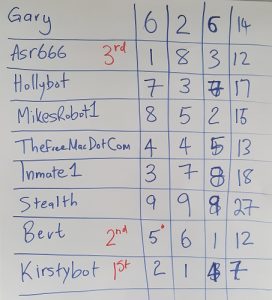Last weekend (21-22nd May 2016) I helped out running Cornwall’s first Tecademy along with other members of Software Cornwall. One of Software Cornwall objectives is to support education in the community and this event was designed to show teachers what resources were available to them and teach them how they could use the available resources when teaching their students. Although the event was targeted at teachers from Cornwall we did have one teacher travel down from Bridport in Dorset.
Day 1
Introduction
The day started with me giving the obligatory (boring) building safety instructions but quickly transitioned into a brief introduction to Software Cornwall by Mike Trebilcock of Cornwall College followed by a quick overview by me of some of the other events Software Cornwall runs that the teachers could potentially send their students on or attend themselves.
Scrum Tennis
Something that seems to be building into a tradition at the events we run, the first exercise we made the teachers attempt was Scrum Tennis. The aim is to give them an idea of how iterations and retrospectives work in software development work, it also has an added bonus of making the participants interact with each other and gets them talking which improves the rest of the event (not that it seemed like communication was going to be a problem at this event).
As we’d run a Mission to Mars event a month before we had the scores that the students had achieved still on the flip chart. When the teachers scores started to plateau as they made smaller process changes between iterations to make things more predictable (which is not necessarily a bad thing) we showed them the scores from the students which were 4-5 times higher than they were achieving. It appears the threat of being beaten by students will give teachers the necessary kick to think outside the box and come up with process changes that dramatically improve their performance. On the final iteration one of the teams did beat the best that any of the students teams did.
What’s always interesting about Scrum Tennis is the solutions different groups come up with to score points. The cascade approach below was a new one to me.
Physical computing
Our first exercise on Raspberry Pis showing the teachers some basic LED control to simulate traffic lights using GPIOZero. The teachers had to build the circuit themselves which caused less problems than I though it was going to and everyone was happy to get stuck in.
Minecraft
A surprise to me was that most of the teachers had never seen/played Minecraft. We started by showing them how to navigate the Minecraft world using the keyboard and mouse and explained how the world co-ordinates work. After they were comfortable moving through the world we taught them how to use the Python interface to Minecraft so they could programmatically modify the world.
Sonic Pi
After a short run through of the possibilities there was an eerie silence for the first 5 minutes of the teachers using Sonic Pi. I’m sure there were perfecting the musical masterpieces and eventually the room started to fill with music.
Controlling Motors
Back to using GPIOZero for the penultimate activity of the day. We gave the teachers a motor, showed them how to connect it up to a h-bridge, use it with GPIOZero and then gave them free rein to create what every they wanted. The videos below show some of the things that were created, sadly I didn’t manage to record everyone’s.
Camera
The day ended with learning how to use the Raspberry Pi camera.
Day 2
Robocode

Day 2 started with a few rounds of Robocode, a programming game where each player writes code to control a robot battle tank which is placed in a battle arena with all the other players tanks. The objective is to be the last tank standing by destroy the other players tanks. Well done to Kirsty for winning overall. As is obligatory the tank in last place was developed by a couple of the mentors.
Microcontrollers (Arduino, micro:bit, etc…)
Up next was an introduction to other Microcontrollers that are available. We didn’t go into too much detail about how to use them as we really wanted to let the teachers discover what a BBC micro:bit is capable of and how to use them. Anthony Lawrence gave an introduction to programming the micro:bit using MicroPython and then it was over to the teachers to try what ever they wanted.
Creative project time
The majority of Day 2 was spent allowing the teachers to develop whatever they wanted using what they had learnt during the event. We had lots of different ideas as shown in the demo videos.
Demos
Next Tecademy
Plans are now afoot for the next Tecademy which will be later this year. Keep an eye on the events section of the Software Cornwall website where details will be posted.

Pingback: Tecademy Blog by Byran Wills-Heath - Software Cornwall
Pingback: Tecademy for Teachers 25th & 26th November 2017 - Software Cornwall - Software Cornwall
Pingback: Tecademy for Teachers 19th & 20th November 2016 - Software Cornwall